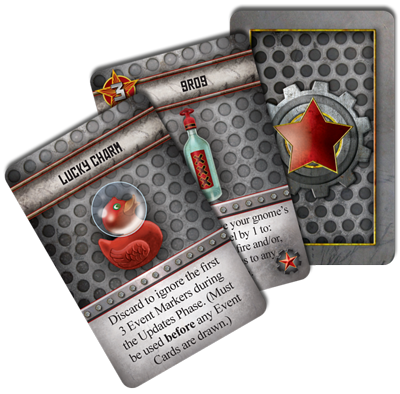
In theory, this system gives players lots of control and fun choices to make. Do you spend a big chunk of time to ensure the fire gets put out, or spend two or three minutes at a time, and hope to get lucky? In practice, the system is prone to overanalysis. It feels very, very computational, with lots of figuring odds and such. Turn orders have to be recorded on a time track, adding to the bookkeeping feel. The action system is not very intuitive at all, and while I appreciate the uniqueness, it feels muddy in actual play.
Player elimination rears its ugly head in Red November. It is very easy for things to go poorly, causing a gnome to die a wet (or often fiery) death. While it's certainly thematic, and can be hilarious, when some poor gnome gets stuck in a flooded room, it really takes away from the cooperative feel. (There is a variant in the rulebook where gnomes respawn, to the designers' credit.) Another detrimental mechanic is the aqualung item, which can be used in the last ten minutes of the game to abandon ship, leaving your "comrades" behind without your help. Why this is included in a game advertised as co-op is perplexing.
When it really comes down to it, I suppose the problems with Red November aren't overwhelming. It's more that it really doesn't do anything that other co-op games don't do better. The game is lasts too long, and has many exceptions in the rules that make it hard to understand. The theme of the crazy gnomes stuck in a submarine, with all sorts of bad things happening, is great, but the gameplay just doesn't match up. In the right group, Red November might be a good choice, especially since it supports up to eight players. But there are dozens of other games I'd choose on any given game night.